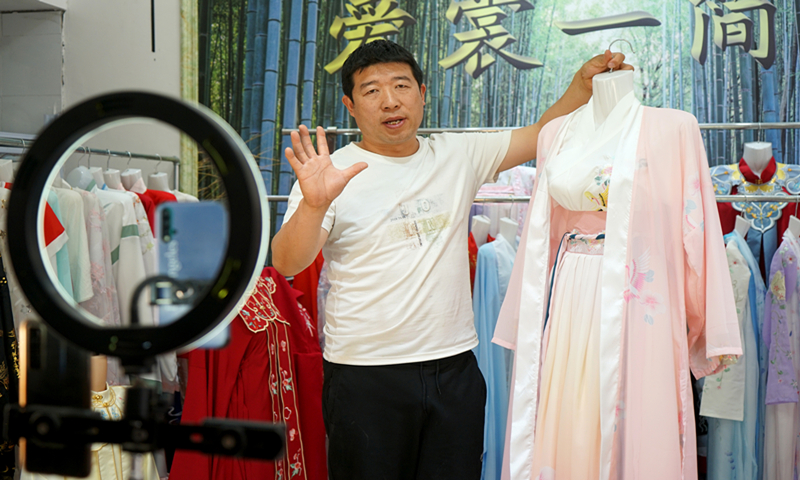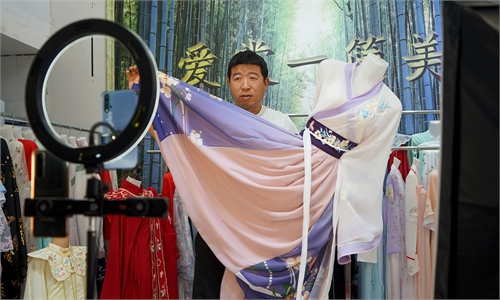East China's inland town Caoxian becomes second largest e-commerce cluster in the country
Traditional stylish Chinese clothes come back with a vengeance

A merchant showcases Hanfu in Caoxian, East China's Shandong Province. Photo: Qi Xijia/GT
When young people in Caoxian County, East China's Shangdong Province get married, some of them will inherit online stores from their parents as a wedding gift, a unique custom in the second largest e-commerce cluster in China.
The inland county has recently become a trending topic in China after a short video uploaded by a local influencer bragged about his hometown using China's short video platform Douyin.
Getting Online
In fact, the small county is the largest manufacturing base for performance costumes, especially Hanfu, and the second largest production base for Taobao after Yiwu city, East China's Zhejiang Province.
It is home to 18,000 Taobao stores which account for 70 percent of sales of the costumes sold online.
In 2020, the county was home to more than 5,000 e-commerce enterprises and over 60,000 online stores, making 15.6 billion yuan ($2.44 billion) in online sales. E-commerce has helped 350,000 people start their own businesses and find employment.
Zhou Aihua would not imagine the e-commerce business would make her one million yuan per month when she first assembled the first personal computer in 2009, after a friend of her in Hanzhou, east China's Zhejiang Province suggested her take her costume making business online.
"It's not easy at the beginning. It takes me a long time learning to communicate with our customers. My store has seen our customers rise for more than six months of a year until I get my first order to make a batch of trendy uniforms," Li said.
Since then, the store took off and saw its sales reach one million yuan in May, beating its 2019 record. To deal with the booming online orders, Li has to outsource the orders to four scattered factories outside the county.
"We are working hard to catch up with the booming number of incoming orders as the country prepares to celebrate the 100th anniversary of the CPC's founding on July 1. Some customer service workers have had to stay up until 3 am every day to take new online orders," Li said.
At present, 20,000 people have been lifted out of poverty through e-commerce and 50,000 people have been attracted to return and work in their home town.
"I have been doing business outside the country. After I heard that e-commerce is so booming that I can't wait to come back home to do business in my hometown," Li Jiqing, an owner of an embroidery factory told the Global Times.
In Li's factory four production lines are adding the embroidery to hundreds items of clothing, simultaneously, which would later be made into Hanfu costumes, packed and shipped to major cities across the country.
Currently Caoxian is home to more than 2,000 Hanfu processing merchants like Li who sell about one third of Hanfu garments in China.
Live-streaming business
New business format like live-streaming has significantly boosted the Hanfu industry in Caoxian County, with some top live streamers able to make 10,000 yuan a day only though a 3-hour live stream.
Wang Fengqing opened an account on live-streaming platform Kuaishou last October and saw his fans grow to 40,000 from scratch.
"The fans and buyers conversion rate is very high. Although we only live-steam three hours a day we are able to sell five hundred sets of Hanfu, making approximately 10,000 yuan. My record is to sell more than 1,200 sets through one live-streaming," Wang said.
The online orders also drove his offline sales to grow by as much as 50 percent in May.
"After Caoxian went viral, I have people knock my door at midnight, asking for trendy goods," Wang said.
To promote live broadcasting into a large-scale industry, the county has been carrying out e-commerce training for local villagers for free, and set up training incubation centers in 27 towns of the county.
In 2020, the county organized a total of 266 training sessions, covering 10,264 people and incubated over 1,000 new online stores. In 2021 the county plans to added 3,000 new online stores to the chart.
Gao Lu, a manager with a live-streaming incubator in Caoxian told the Global Times that since the platform opened in May they have nearly 50 live streamers broadcasting at the same time, promoting Han-style traditional clothes.
The incubator would provide the goods, venue and necessary training for the live-streamers and all they need to bring are smartphones hooked to high-speed internet, Gao said.
"We would train them how to interact with the audience and how to introduce the products," Gao said.
"Since we launched the platform in May, some top live-streamers can make 400 yuan a day," he added.
The flexible time, low investment and free training has attracted many to step into the business. Ma Wenshu, a new live streamer with an incubator is able to sell dozens of items of clothes after completing training.
Having worked in restaurant business, the middle-aged woman in Caoxian has seen live-streaming as her new career.
"Now is the era of e-commerce live-streaming. I don't want to be left behind by this era. I just want to try my luck," Ma said.




